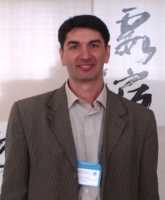Addiction, Author Interviews, Inflammation / 31.07.2015
Modern Wireless Devices May Cause Excessive Oxidative Stress In Humans
 MedicalResearch.com Interview with:
Prof. Igor Yakymenko
Laboratory of Biophysics, Institute of Experimental Pathology, Oncology and Radiobiology NAS of Ukraine
Medical Research: What is the background for this study? What are the main findings?
Prof. Yakymenko: We know a lot about both health effects and metabolic effects of radiofrequency radiation (RFR) today, including mutagenic and carcinogenic effects. For example, epidemiological studies over the world indicate that 5 years of cell phone use 20 min per day increase risk of acoustic neuroma 3 times. Or, for example, 4 years of cell phone use 1 hour or more per day increase risk of some kinds of brain tumors, including glioma, 3-5 times. But it was not understandable the primary mechanisms of such effects. In our study we had analyzed about 100 recent studies on metabolic effects of radiofrequency radiation, including our own experimental data, and demonstrated that oxidative/free radical effects are mandatory feature of RFR exposure of living cells. Moreover, the chronic radiofrequency radiation exposure can produce chronic oxidative stress in living cells as a first step for possible development of bulk of hazardous health effects.
(more…)
MedicalResearch.com Interview with:
Prof. Igor Yakymenko
Laboratory of Biophysics, Institute of Experimental Pathology, Oncology and Radiobiology NAS of Ukraine
Medical Research: What is the background for this study? What are the main findings?
Prof. Yakymenko: We know a lot about both health effects and metabolic effects of radiofrequency radiation (RFR) today, including mutagenic and carcinogenic effects. For example, epidemiological studies over the world indicate that 5 years of cell phone use 20 min per day increase risk of acoustic neuroma 3 times. Or, for example, 4 years of cell phone use 1 hour or more per day increase risk of some kinds of brain tumors, including glioma, 3-5 times. But it was not understandable the primary mechanisms of such effects. In our study we had analyzed about 100 recent studies on metabolic effects of radiofrequency radiation, including our own experimental data, and demonstrated that oxidative/free radical effects are mandatory feature of RFR exposure of living cells. Moreover, the chronic radiofrequency radiation exposure can produce chronic oxidative stress in living cells as a first step for possible development of bulk of hazardous health effects.
(more…)






